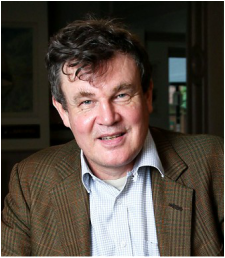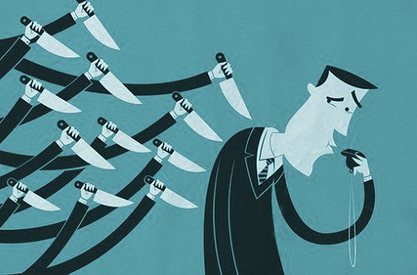Newspapers caught in a compromising position over whistle-blowingFriday 20 March, 2015
Whistle-blowers are the lifeblood of journalism. We are taught from day one that protecting sources is paramount, even in the face of the direst threats. A true journalist would go to jail rather than reveal a source. For if we do not look after them, people will not dare talk to us. Then there would be no stories. Our love may be born out of self-interest, but it is nonetheless genuine and eternal. Politicians, too, claim to love whistle-blowers. So do the police. So do local authorities. So do big corporations. They all have "provisions in place", as the jargon has it, for people to speak out when they see wrongdoing in society, in the workplace, just about anywhere really. So long as the speaking out is done within the organisation, where it can be hushed up - sorry, I mean dealt with internally. And above all, so long as no one talks to the Press. For a society that claims to be open and ready to confront its demons, we are going about it in a very strange manner. In recent months:
Public opinion has tended to favour the whistle-blower and journalist – even where money changes hands, as we have seen in successive acquittals in the Operation Elveden court cases – but that is not the view of the Establishment. At government level, every platitude about open society seems to be matched with another measure to allow more state intrusion and enforce greater secrecy. When Helen Donnelly and Julie Bailey spoke up about what they saw at the Mid Staffordshire NHS trust they were disbelieved and vilified. Bailey, pictured, suffered such abuse that she felt she had to move home. The women were proved right and honoured for exposing the scandal; Jeremy Hunt promised protection for health service whistle-blowers. Yet consultants at other hospitals were still suspended or sacked for asking awkward questions. If the most senior doctors can't raise their heads with impunity, what hope for nurses or clerks?
Andrew Norfolk's early stories in The Times about sexual exploitation in Rotherham brought him the bounty of a car boot full of incriminating documents. When he reported on their contents, the local council's first response was not to put matters right but to start a leak inquiry. This same mentality has been demonstrated by other local authorities, police forces and government departments, as Press Gazette reports here. Business is equally unenthusiastic about people who dare to suggest that all is not as rosy as their websites and advertisements suggest.  Peter Oborne Peter Oborne
Now here's the awkward thing: newspapers are businesses too. And sometimes people working for newspapers act unprofessionally or illegally. Sometimes middle managers bully or harass their staff.
The past month has seen two examples of journalists speaking out about the way their news organisations functioned: Peter Oborne in his blog on why he had resigned from the Telegraph and James King in another blog on his "year of ripping off the web" for Mail Online. In both instances, the management issued statements saying that they "refuted" the allegations (a depressing misuse of language from people at the top of two businesses built on words). Let's just say that both denied the charges - or even that the Mail rebutted them, given that it at least took the trouble to answer them point by point. Several other journalists came forward anonymously to corroborate Oborne's assertion that commercial considerations were influencing editorial judgments, and two who worked with King for Mail Online in New York have been in touch with SubScribe to back up his allegations of systematic plagiarism. (See below). Almost every working environment has become harder as a result of financial constraints since 2008. In the public sector budgets have been cut, targets have become tougher and, with reduced resources, ever further from reach. The temptation to cut corners is greater. We have seen this with the Colchester hospital cancer records scandal, which was surely not an isolated case.
Newspapers, as Oborne's resignation blog showed us, have also been piling pressure on staff as they struggle in a commercial environment of decreasing circulations and internet upstarts. In a crass reaction to Oborne, the Telegraph carried a front-page story suggesting that two members of the Times's advertising staff had killed themselves because of stress at work. The report brought instant and widespread condemnation; the Samaritans issued a reminder of its guidelines on reporting suicides and pointed out the danger of linking deaths and ascribing a common cause to cases which may well turn out to be coincidental. The story was well out of order, but there is no doubting that the pressure on people in our industry, as in others, is greater than ever before. And that’s without the post-hacking fallout, Leveson and police investigations. The acquittal of four senior Sun journalists who paid contacts for tips is a cause for celebration in our community tonight. We are appalled at what they and their families were put through for doing their jobs – but we should not forget that the evidence against them came from the employer they sought to serve.
John Kay, pictured, certainly didn't. Immediately after leaving court, he accused executives of breaking the first rule of journalism by revealing his confidential source - Bettina Jordan-Barber, who was jailed for a year in January after admitting misconduct in public office. "I'm very, very upset that a trusted source of The Sun ended up in jail as a result of betrayal by my own company," he said. It is frankly astonishing that, at 71, Kay has said that he wants to go back to work for the Sun. If he does, he is likely to find a markedly different industry from the one he left when suspended after his arrest more than three years ago. For while Weeting and Elveden suspects have been stuck in limbo on police bail, thousands of ordinary journalists without their high profile have also found life increasingly hard. It has been years since reporters simply went along to council or court, took a shorthand note and phoned in their copy before heading to the pub. Workloads have been getting heavier for a long time, but now some organisations are playing a grotesque game of Buckeroo, seeing by how much they can increase the burden on staff before they collapse under the weight. Those council and court reporters write on laptops as the meeting or case proceeds - noting not only what is happening before their eyes, but also keeping track of what social media are saying and tweeting along the way. Their first take goes up online, they update and update and are then supposed to file a polished version for the paper before heading to the in-house studio to offer a video analysis. When they escape the office to research a story in person rather than on the telephone they go with mobile in hand, not to make calls, but to take pictures because all the photographers have been sacked. Subs who used to draw pages, check copy and write headlines are rarely trusted with such tasks these days. Designers create the pages, news editors write headings and no one has time to check facts. Subs, where they survive, are there to pump "content" out on to every conceivable platform and take the blame when mistakes appear. With fewer and fewer people to share the extra duties, stress levels are stratospheric - and a lot of people are finding them unbearable.
Most of us who worked in Fleet Street in the last century have anecdotes of incredible management understanding and kindness towards colleagues who struggled with the marriage breakups, mental health problems, gambling, alcoholism and drug abuse that have often been a by-product of the jobs we do.
To those who scorn us, that sentence will prove what scum we are. Rather it shows is that journalism has always been a stressful occupation. It has always involved long, antisocial hours; it has always attracted workaholics who generate their own stress. If you can become addicted to work, you can equally become addicted to alcohol, drugs or whatever. Managements understood that and looked after those who fell over, financing therapy and offering extended paid sick leave. The trouble is that over the past decade or so, the stress has come not from inside the journalist's head, but from outside. As more have buckled under the pressure, the corporate generosity of the past has become unaffordable, and management tolerance of any perceived weakness among members of staff has diminished. The paper may run stories and leaders about mental health issues, but the HR team upstairs will not necessarily read them. When you have economies to make, paying someone who is off sick their full salary for up to a year is not appealing. Better to offer them an "exit package" that is marginally more attractive than their contracted terms - on condition that they sign a document whose existence they must never divulge. It's called a compromise agreement and is a standard feature of employment law. The compromise is "We'll give you a bit more than you're entitled to; you won't air our dirty linen in public". In journalese, we would describe the confidentiality element of such a pact as a gagging clause, the payment as hush money.
Loyalty is no more cherished in our industry than it is by banks that neglect old customers while offering preferential rates to attract new business. And so the old-stagers are waved off into the sunset with a few thousand quid in return for a promise not to say anything that might reflect badly on their former employer.
Whistle-blowing is never an easy choice. It takes a great deal of courage to stand up and speak out when you know that to do so will bring the wrath of the NHS, a police force or a big corporation on your head. They have the greater resources, power and influence on their side. They can afford the expensive lawyers. Why would you risk your home and your sanity for a fight you are likely to lose? Whistle-blowers may be the lifeblood of journalism, but our bosses are no keener than any other employer on having them in their midst. They are just as ready to write them off as disaffected or - surprisingly frequently, considering the lengths of service often involved - incompetent workers. In newspapers, as in all businesses, one person's whistle-blower is another's traitor. Life at Mail Online in New YorkJames King's account of his experiences working in the Mail Online office in New York has been rejected by the Mail, which has answered his allegations point by point. You can read his original article and the Mail's response here.
Two other journalists who worked as writers in the same office at the same time have meanwhile contacted SubScribe to offer their insight on the way the operation works. Both have since moved on. 
I was berated for neglecting to include "cheerleader in a bikini" in a head. Anything involving race or breasts is a big hit...getting Drudged was the ultimate compliment
Alex writes: In my memory, there wasn’t a single story out of the hundreds I wrote that didn’t come from another news site. You were assigned a story from a rolling list of links to other publications and then you rewrote it. You could do a little extra googling for other news sites to see if there were any extra facts, if you wanted. If there was a story without pics we’d rarely do it, but if a news site such as a local ABC affiliate had a story on it, we’d just take grabs from their videos.
The worst was when, as King described, you’d be assigned to rip off a really great article from say, The New York Times. A long form piece of exclusive journalism like that - it’s hard to make it your own, especially when you’ve got about an hour and a half in which to do it. My headlines were frequently changed (often to include typos) to make them more salacious, and, as King wrote, often made factually incorrect. I was once berated for neglecting to include the words ‘cheerleader in bikini’ in my headline. Anything involving race or breasts is a big hit with the Mail editors and getting ‘Drudged’ (linked on the Drudge Report) was the ultimate compliment. As far as I’m concerned, everything James King wrote is true. I worked at the Mail at the same time he was there and I think he let them off easy! 
Editors have graphs on their screens showing site traffic, which dictates where stories will be placed. I don't think I've ever worked in a newspaper so led by its readers' whims
M writes: I worked there from spring 2013 to July 2014, first as a freelancer and later as staff.
James gives a pretty accurate account of how the newsroom works. Once you become staff you are expected to put in the occasional call to a police press officer or the actual subject of a story. However, with a high turnover of stories there was never time to wait for a call back - you normally have an hour and half to get the story link, rewrite it, add pictures and file. The more senior reporters do more traditional reporting and if there's a big story they will go out and cover it. James mentioned the use of bylines. Around May last year, I'd estimate the majority of the news room were using the generic Mail Online Reporter. Then Martin Clarke had a fit about it at a lunchtime conference, asking if we were ashamed to have our names on the stories. An awkward silence followed because, yes, many of us were ashamed, knowing the content was little more than a quick rehash of another reporter's work. As James said, there is little interference in your work. You are assigned the next story up on the list, which is done in order of what is most likely to appeal to the readership. Martin has a very hands on approach to the news list, his initials would appear on it as a sign of a story being a priority. The list would provide a link to a news report and suggested headline. The editors have graphs on their screens showing site traffic, which dictates where stories will be placed and whether more work will be done on them. I don't think I've ever worked in a newspaper that is so led by its readers' whims. Rather than make calls you trawl through other newspaper accounts or social media accounts of those involved in the stories. There were occasions where you would be asked to contact a source directly. With the legal problems I was surprised, too, at the lack of apology or removal of offending articles. The first time a legal complaint was made about a piece I had written, I was told by an office manager that we don't remove the story. The editors do not work like editors at other publications. There are no copy editors or fact checkers. My understanding of how our copy was dealt with is that they would skim over, check the main points of story are there, and then tweak the heading and place it according to the analytics. I sympathised with James's account of going to job interviews only to find you are being grilled for details on how the Mail is so successful. In December 2013 at least four of us were contacted by the editor of a US celebrity website about joining their company. In the phone interview and later in person, I was pretty much just questioned about the newsroom set up and Martin's involvement. In my interview I was asked if I'd ever seen Martin throw a phone at anyone. When you are desperate to find new work it is frustrating to realise you are being grilled for information rather than prospective employment. |
|
Speaking out

A free press is essential to a healthy democracy. There is a purpose to journalism, and it is not just to entertain. It is not to pander to political power, big corporations and rich men. Newspapers have what amounts in the end to a constitutional duty to tell their readers the truth.
It is not only the Telegraph that is at fault here. The past few years have seen the rise of shadowy executives who determine what truths can and what truths can’t be conveyed across the mainstream media. Read the full article here 
In the southwest corner of the room, the publisher, Martin Clarke — best described as a cross between Seinfeld's Mr Pitt and a withered version of Simon Cowell—could often be seen at his desk spewing profanity or threatening to fire someone for infractions as minor as using the wrong-sized image in an article preview. A healthy fear of Clarke's frequent tantrums seemed to be the motivating factor behind nearly all editorial decisions.
Read the full article here 
I feel full of optimism that we have opened that door and people now feel a bit safer in speaking out. We don't want to destroy the NHS, far from it. Six, seven years ago I was so proud of the NHS, Mum too. We'd always had fantastic care. What other country did what we did? But I do think we have lost our way. I believe the government has to be honest and say we just can't afford what we are trying to do. We put on bionic arms and all sorts. Miraculous things. But we also have people lying in beds with terrible pressure sores and dying of dehydration.
Read the full interview here 
You have sent out exactly the wrong message. Whistleblowers are pawns who will not receive help, even from you. You have left us to our fate. This will have a further deterrent effect on staff raising concerns. The managers who have victimised us will feel more secure than they already were. They remain unaccountable. Patients who depend on our freedom to speak up will be less safe
Read more of the sacked paediatrician's response to the Francis report on Mid Staffs here For years there were people in that town in South Yorkshire who were desperately concerned about what was going on. They tried their very best to raise the alarm. Young girls and their parents were pleading with police, frontline workers were telling their bosses, internal reports were written, seminars held, letters sent to chief constables, to MPs to government departments. And absolutely nothing changed. In the end, in desperation, some very brave people decided to put their faith in journalism.
See Andrew Norfolk speaking here 
An unfortunate side effect of the development of all these new surveillance technologies is that the work of journalism has become immeasurably harder than it ever has been in the past.
Journalists have to be particularly conscious about any sort of network signalling, any sort of connection, any sort of licence-plate reading device that they pass on their way to a meeting point, any place they use their credit card, any place they take their phone, any email contact they have with the source because that very first contact, before encrypted communications are established, is enough to give it all away. Read the full interview here 
I assess and so does the director general of MI5 that the Snowden leaks did cause damage.
It has had an impact on the ability of our agencies to do the work they need to do. It would be fair to say it has had an impact not just on agencies in the UK. If work has been done to try to mitigate the impact, that uses resources. See her speaking here 
Osita Mba lifted the lid on a £10m ‘sweetheart deal’ between HMRC and Goldman Sachs by whistle-blowing. When HMRC suspected he had spoken to The Guardian, his belongings, emails, internet search records and phone calls, and those of his then wife, were intercepted by HMRC.
Read the full blog by press officer of a whistle-blowers' charity here |
How you can be a SubScriber
|
Sign up for email updates (no spam, about one a month)...
|
|
...make a financial contribution
I'd like to subscribe
There will never be a charge for reading SubScribe,
but if you would like to make a donation to keep it going, you can do so in a variety of ways by pressing this button. Thank you. |







